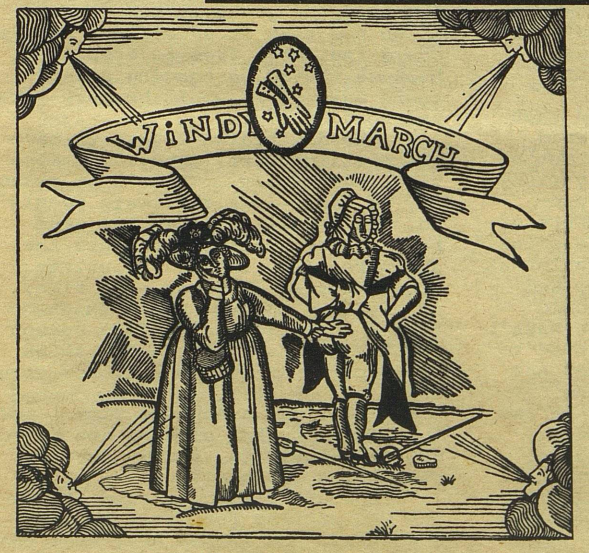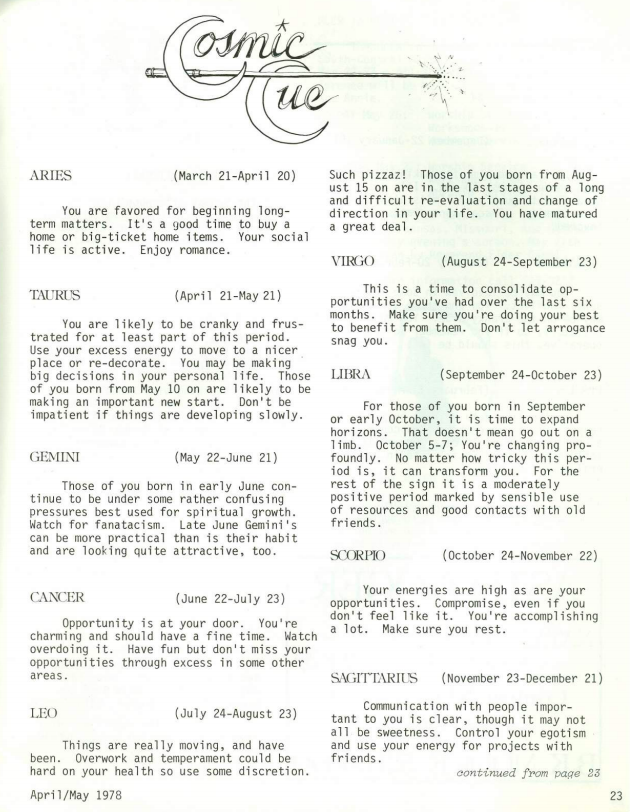ASTROLOGY
Astrological and cosmic guidance is woven throughout the pages of lesbian and feminist print from the 1970s. Astrologers provided personal advice and therapy to individuals who sought it, and also directed individuals on how to navigate oppressive societal systems. Astrological references were used in bars and bookstores, and as author aliases by writers who refrained from using their given names. For some, Astrology was a way to engage in the surrounding counterculture; for others it became a lifelong passion and practice.
Lily Hansen (aka Lilli Vincenz), “Homoscope: Is Our Fate in the Stars?,” GAY, April 1970
Movement pioneer Lilli Vincenz first joined the Mattachine Society of Washington (MSW) after being discharged from the Army in 1963. As a member, Vincenz edited and contributed to the short-lived magazine The Homosexual Citizen, writing under the pseudonym Lily Hansen.
Vincenz left the paper over disagreement with the paper’s executive board in 1970, as she described in the article “Homoscope” published in GAY shortly after. She explained that after completing research on Astrology and Homosexuality, her personal astrologer wrote an article on her findings for The Homosexual Citizen. After a charge led by Frank Kameny, the article was denied publication out of worry that it would not present a “respectable image.”
Vincenz later founded the Community for Creative Self-Development (CCSD) in 1992, a space for the LGBTQ+ community to achieve their psychological, creative, and spiritual potential. As for her own religious views? Vincenz described them as an “individual relationship with God, work with guardian angels, past lives, spirit release, and practical applications of wisdom from a higher reality that is prudently considered.”
Above and below: Unknown Creator, “Zodiac Employment Agency,” Lesbian Tide, Vol. 2, Iss. 5, December 1972
Astrology, according to Zodiac Employment Agency founder Royce M. Barlow, was key in “placing the right person in the right job at the right time.” The agency used various planetary aspects and intensive birth charts to create job matches for clients. Though open to doing business with anyone “no matter sexual preference,” Barlow focused on “employment discrimination against gays and how to fight it.”
Barlow, a self-identified gay Astrologer, was first denied a license to operate the agency in 1971 on grounds of “moral turpitude,” a legal interpretation claiming an individual has violated “accepted community standards.” After gaining license the next year, the agency existed for more than ten years in the Los Angeles area.
Miriam Dyak, “Perceptions,” Mainely Gay, Vol. 4, No. 11, November/December 1977
Above and below: “Lady of Fashion” (aka Djuna Barnes), “Ladies Almanack,” The Furies, Vol. 2, Iss. 2, March-April 1973
Djuna Barnes originally published the “Ladies Almanack'' under the cheeky pseudonym “Lady of Fashion” in Paris, 1928. In it, she offered a story of a “part about heaven that has never been told,” describing personified Astrological sun signs and their relationship with Lucifer. To Barnes, the female-facing signs represented the first woman “born with a difference.” Though Barnes’s intent in writing the almanack is still disputed, those closest to her understood the characters to represent her lesbian intellectual circle in Paris.
Excerpts from the Almanack were republished by The Furies Collective in 1973. Djuna Books, one of three feminist bookstores in New York City in its time, operated on West 10th Street from 1977-1982.
Bonnie Moore,“Cosmic Cue” Astrology Corner, Pointblank Times, Vol. 4, No. 2, April-May 1978
Astrology columns, such as this one with the playful heading “Cosmic Cue,” provided readers guidance at the end of publications, perhaps alleviating the gravity of preceding articles.
“The horoscope lies between world news and want ads, in the funny paper section, where your tomorrow and my tomorrow are properly predicted. I like it there.” – Jane Rule in The Ladder, author of the 1964 novel Desert of the Heart (inspiration for the 1985 lesbian cult-classic film “Desert Hearts”)
Penny House, "The New York Women's Coffeehouse," DYKE, Vol. I, Iss. 1, Winter 1975-1976
Inspired by Full Moon, a women’s coffeehouse in San Francisco, Shari Tahler and Judy O’Neil formed the Women’s Coffeehouse in New York. The Coffeehouse sought to serve women outside of the male-centered, Mafia-owned bar culture, and was operated by a seven-woman collective.
The Coffeehouse sat on the ground floor of a Greenwich Village brownstone on 7th Avenue owned by June Arnold and Parke Bowman, founders of Daughters Publishing Co. Arnold, author of The Cook and The Carpenter, organized the first Women in Print Conference in 1976.
T. Cook, “Astrologer Advertisement,” 5th Freedom: Publication of the Buffalo Gay Community, The Mattachine Society of the Niagara Frontier, July 1975
5th Freedom was published monthly by the Mattachine Society of the Niagara Frontier (MSNF) from 1970-1983 in Buffalo, New York. Buffalo did not have lesbian-only print in the era, but Madeline Davis and other Radicalesbian and MSNF founders were responsible for much of the 5th Freedom’s production through its run.
Davis went on to host events on Astrology and Spirituality for the Buffalo community, sometimes in partnership with Joan Rzadkiewicz, whom she credits in Boots of Leather, Slippers of Gold: The History of a Lesbian Community. Davis was also a Reiki Master and a founding member of Western New York area Spiderwoman’s Coven. In 2001 she founded the Dr. Madeline Davis LGBTQ Archive of Western New York, where a donation can be made to honor her legacy: Davis passed away during the completion of this project. Her memory lives on in our work.











